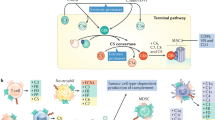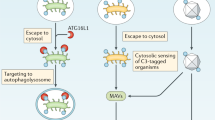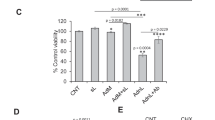Abstract
CD59 (protectin) and CD46 (membrane cofactor protein, MCP) are membrane-bound complement regulator proteins which inhibit complement-mediated cytolysis of autologous cells. CD59, a phosphatidyl-inositol-anchored glycoprotein, inhibits the formation of the terminal membrane attack complex (MAC) of complement and was found to be a second ligand for CD2 contributing to T-cell activation. In 20 colorectal normal mucosa samples, in ten adenomas, 71 carcinomas and in ten liver metastases derived thereof, CD59 was inconsistently expressed in the epithelial compartment. In carcinomas CD59 expression in the whole neoplastic compartment was more often found in well- and moderately differentiated tumours. By contrast, focal expression or even complete lack of CD59 was more often found in poorly differentiated tumours (P = 0.021). In addition, carcinomas without metastases at the time of operation (Dukes A/B) more often expressed CD59 in the entire neoplastic population compared to those carcinomas which had already metastasised (P = 0.018). There was no correlation between the mode of CD59 expression in colorectal carcinomas and the tumour type or location. CD46 has C3b/C4b binding and factor-I dependent cofactor activity and is broadly expressed in various cells and tissues. In the epithelial compartment of normal colorectal mucosa, of all adenomas, carcinomas and their liver metastases, CD46 was expressed throughout the epithelial compartment. Since CD46 was consistently expressed in colorectal carcinomas the low expression or even lack of CD59 in a subset of tumours might not lead to critical complement-mediated attack of CD59-negative tumour cells. Regarding CD59 as a natural T-cell ligand involved in cognate T-cell-target-cell interaction, however, loss of CD59 might well be a selection advantage, provided that tumour antigen-mediated T-cell toxicity in colorectal carcinoma exists.
This is a preview of subscription content, access via your institution
Access options
Subscribe to this journal
Receive 24 print issues and online access
$259.00 per year
only $10.79 per issue
Buy this article
- Purchase on Springer Link
- Instant access to full article PDF
Prices may be subject to local taxes which are calculated during checkout
Similar content being viewed by others
Author information
Authors and Affiliations
Rights and permissions
About this article
Cite this article
Koretz, K., Brüderlein, S., Henne, C. et al. Expression of CD59, a complement regulator protein and a second ligand of the CD2 molecule, and CD46 in normal and neoplastic colorectal epithelium. Br J Cancer 68, 926–931 (1993). https://doi.org/10.1038/bjc.1993.456
Issue Date:
DOI: https://doi.org/10.1038/bjc.1993.456
This article is cited by
-
Complement‐induced protection: an explanation for the limitations of cell‐based tumour immunotherapies
Immunology & Cell Biology (2012)
-
Membrane Proteins: The Key Players of a Cancer Cell
The Journal of Membrane Biology (2011)
-
Expression of the membrane complement regulatory protein CD59 (protectin) is associated with reduced survival in colorectal cancer patients
Cancer Immunology, Immunotherapy (2006)
-
Cellular and complement-dependent cytotoxicity of Ep-CAM-specific monoclonal antibody MT201 against breast cancer cell lines
British Journal of Cancer (2005)



